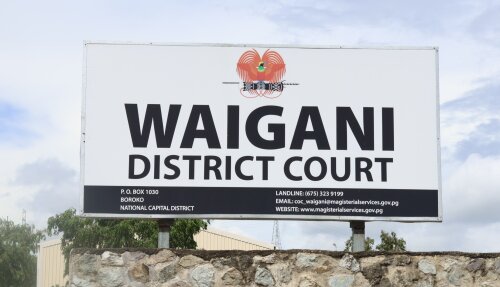Best Antitrust Litigation Lawyers in Papua New Guinea
Share your needs with us, get contacted by law firms.
Free. Takes 2 min.
Or refine your search by selecting a city:
List of the best lawyers in Papua New Guinea
About Antitrust Litigation Law in Papua New Guinea
Antitrust Litigation, also known as competition law litigation, involves legal disputes regarding practices that may restrain trade, restrict competition, or abuse market dominance. In Papua New Guinea, antitrust laws are vital for promoting fair competition, curbing anti-competitive behavior, and ensuring consumer welfare. These laws address issues such as cartels, price fixing, market sharing, and misuse of market power. Although Papua New Guinea is a developing economy, it has established regulatory frameworks to uphold competitive markets, primarily under the Independent Consumer and Competition Commission Act.
Why You May Need a Lawyer
Seeking legal assistance in antitrust litigation can be crucial for individuals and businesses facing complex disputes or under investigation for breaching competition laws. Common situations where legal help is required include:
- Receiving a notice of investigation or inquiry from the Independent Consumer and Competition Commission
- Facing allegations of price fixing, bid rigging, market sharing, or other cartel behaviors
- Being accused of abusing a dominant market position or engaging in exclusive dealing
- Challenging anti-competitive mergers or acquisitions
- Bringing a complaint against another business for anti-competitive conduct
- Negotiating settlement agreements or seeking immunity/cooperation in enforcement actions
- Defending against civil penalties, criminal charges, or seeking compensation for damages suffered due to anti-competitive conduct by others
Legal interpretation and strategic litigation advice are often needed to navigate specialized procedures, complex economic evidence, and evolving legal standards.
Local Laws Overview
Papua New Guinea’s principal legislative instrument for competition regulation is the Independent Consumer and Competition Commission Act 2002 (ICCC Act). This Act prohibits specific anti-competitive behaviors and provides the framework for enforcement and litigation. The key aspects include:
- Anti-competitive Agreements - Prohibits businesses from making agreements that substantially lessen competition, such as price fixing, market division, and collusive tendering.
- Misuse of Market Power - Prevents businesses with significant market power from using it to eliminate or restrict competition.
- Mergers and Acquisitions - Requires certain mergers or acquisitions that may lessen competition to be notified and reviewed by the ICCC.
- Consumer Protections - The law includes provisions that protect consumers from unfair trading practices related to competition.
- Sanctions and Remedies - The law allows for both civil and criminal penalties, including fines, corrective orders, and in some cases imprisonment.
The Independent Consumer and Competition Commission is the regulatory authority responsible for investigating and prosecuting anti-competitive conduct. Private parties may also initiate claims for damages if harmed by a breach of competition law.
Frequently Asked Questions
What is considered anti-competitive behavior under PNG law?
Anti-competitive behavior includes practices like price fixing, bid rigging, market sharing, abuse of market dominance, and agreements that substantially restrict competition.
Who enforces antitrust laws in Papua New Guinea?
The Independent Consumer and Competition Commission administers, monitors, and enforces antitrust laws in Papua New Guinea.
Can individuals or small businesses bring a case for antitrust violations?
Yes, individuals and businesses that suffer loss due to anti-competitive conduct can bring legal action to seek damages or other remedies.
Are mergers and acquisitions regulated for competition concerns?
Yes, certain mergers and business acquisitions that may affect competition must be notified to and reviewed by the Independent Consumer and Competition Commission.
What penalties can result from breaching antitrust laws?
Penalties can include significant fines, compensation orders, injunctions restraining conduct, or even criminal sanctions for serious offenses.
How are complaints investigated?
The ICCC investigates complaints by gathering information, reviewing documents, conducting interviews, and may initiate formal proceedings if breaches are suspected.
Can parties negotiate settlements with regulators?
Yes, in some instances, parties may seek settlements, including cooperation agreements or commitments to alter practices, subject to approval by the regulator.
Are there defenses available to accused parties in antitrust cases?
Yes, defenses may include lack of substantial effect on competition, lack of market power, or compliance with exemptions or authorizations provided by law.
Is legal representation required in antitrust litigation?
While not mandatory, proving compliance or defending against allegations often involves complex legal and economic arguments, so professional legal representation is strongly recommended.
What is the typical process for an antitrust litigation case?
The process usually involves investigation, potential enforcement action by the regulator, hearings or court proceedings, and the possible imposition of penalties or remedies.
Additional Resources
If you need further information or support, consider these resources:
- Independent Consumer and Competition Commission (ICCC) - The primary body regulating and enforcing competition and consumer protection laws in Papua New Guinea.
- Papua New Guinea Law Society - For finding qualified legal practitioners experienced in antitrust and competition law matters.
- Ministry of Justice and Attorney General - For legal policy, reforms, and access to legislative documents such as the ICCC Act.
- Business Councils and Chambers of Commerce - May provide information and support regarding compliance with competition laws.
These organizations offer essential guidance, documentation, and sometimes referrals to legal professionals.
Next Steps
If you believe you need legal assistance in antitrust litigation in Papua New Guinea, here are practical steps you can take:
- Document Your Situation - Gather all relevant documents and correspondence relating to your issue.
- Contact a Qualified Lawyer - Seek advice from a lawyer or legal firm specializing in competition and antitrust matters.
- Consult the ICCC - If you are unsure whether you may be in breach or are a victim of anti-competitive practices, consider approaching the ICCC for initial guidance.
- Explore Mediation or Settlement Options - Where appropriate, ask your lawyer about possible negotiated solutions or settlements to resolve the issue outside court.
- Stay Informed - Regularly monitor legal and regulatory updates to stay compliant and protect your interests.
Act promptly, as time limits can apply to both regulatory investigations and private legal actions. A knowledgeable legal professional can help you navigate the process and protect your rights.
Lawzana helps you find the best lawyers and law firms in Papua New Guinea through a curated and pre-screened list of qualified legal professionals. Our platform offers rankings and detailed profiles of attorneys and law firms, allowing you to compare based on practice areas, including Antitrust Litigation, experience, and client feedback.
Each profile includes a description of the firm's areas of practice, client reviews, team members and partners, year of establishment, spoken languages, office locations, contact information, social media presence, and any published articles or resources. Most firms on our platform speak English and are experienced in both local and international legal matters.
Get a quote from top-rated law firms in Papua New Guinea — quickly, securely, and without unnecessary hassle.
Disclaimer:
The information provided on this page is for general informational purposes only and does not constitute legal advice. While we strive to ensure the accuracy and relevance of the content, legal information may change over time, and interpretations of the law can vary. You should always consult with a qualified legal professional for advice specific to your situation.
We disclaim all liability for actions taken or not taken based on the content of this page. If you believe any information is incorrect or outdated, please contact us, and we will review and update it where appropriate.
Browse antitrust litigation law firms by city in Papua New Guinea
Refine your search by selecting a city.















